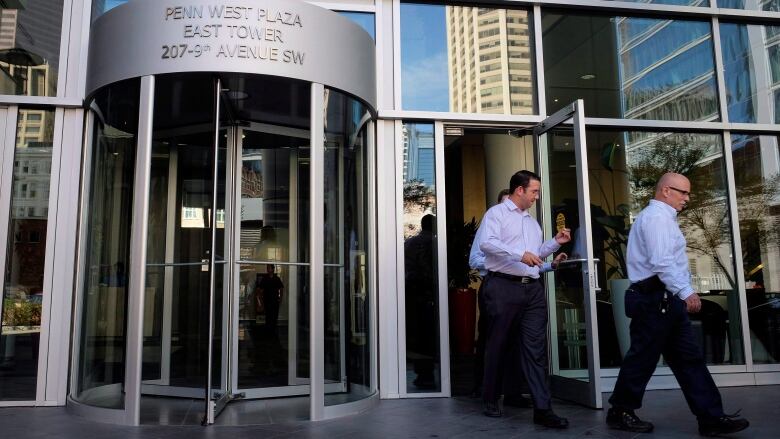Economic downturn in Alberta invigorates other businesses
There's a bigger labour force to draw on and new opportunities

Stephen Scott worked his way into a plumengineering job with Cenovus Energy, buthe's looking elsewhere to start again afterbeinglaid off.
The energy sector as we know it is gone- Todd Hirsch, ATB Financial
His futurewon't look like his past.
"Renewables interest me. I think interest in that will pick up. They expect it to grow four to 10times over the next 10years. And with the new airport going in, logistics and supply chain are increasing."
With an MBA and 20 years into aprofessional engineer career, Scott's layoff was a surprise.
So far, he's managing he still has his severance and his wife managed to get more hours at her work.

Scott is taking advantage of his downtime to walk his kids to school and work around the house.
Current economysparks opportunities
There are a lot of people like Scott in Calgary right now. With deepening layoffs in the oil and gas industry, more will join him.
- Calgary economic forecast calls for heavy 'humility' in 2016
- ANALYSIS |Alberta's economy: beyond the buzzwords, fears and misperceptions
- Surprise! Alberta's economy is driven by more than just oil and gas
Some people are managing, others not so well. Economically Calgary has taken a hit.
But there could be an upside for businesses and individuals.
ATB economist Todd Hirsch says the increase in unemployed, highly qualified oil and gas types who are hungry for work may actually result in a more diversified economy.

"The energy sector as we know itis gone," he said.
Other industries expand
Hirsch knows there's a danger of sounding glib when trying to take a positive spin on plummeting oil prices.
- Sinking oil prices: Winners and losers
- ANALYSIS |Seeking a political scapegoat for plunging oil: Don Pittis
- 4 oil forecasters point which way prices will go
"Having been laid off twice in my career I know it's not easy."
Buthe sayswhere one industry contracts,others expand.
"There are examples of non-energy industries that are doing interesting things. For example, digital media marketing. For the first time, they can get into the market because now people are willing to get paid less."
Hirsch thinks this downturn will permanently change how Calgarians and the economy work.
The oil king has fallen
Ayear ago, it was too hard to find talent in Calgary.- Cameron Prockiw, Vovia digital marketing
When oil is king, and Calgary booms, it distorts the labour force. Wages are high, the labour pool tight and the costs of setting up a new company become too big. When oil drops, so do those pressures.
Cameron Prockiw feels the weakening of those pressures. He is the founder and CEO of the digital marketing business Vovia. Prockiw opened satellite offices outside of Alberta because"ayear ago, it was too hard to find talent in Calgary."
He couldn't compete with wages young recruits were offered at oil and gas companies or the "Shawsof the world."
Things have changedover the past year he has hired seven new people and refocused thebusiness almost entirely on Alberta clients. Right now he has one position open, with 200 people vying for it.
And because his clients aren't energy companieshe hasn't felt the pinch. Yet.
Other companies able to hire workers
Like any business in this city, he knows the ripple effect of low oil may eventually reach him. Many of his clients are home builders and they rely more directly on oil and gas wealth, whichcould spelltrouble in the future.
BluEarth Renewablesis another company finding it easier to fill jobs in the midst of layoffs.
Company COO Kelly Matheson-King says they've hired 10people in the last six months.
"We have certainly seen more applications than in previous years. Many are from the oil and gas sector."
But Matheson-King is careful not to suggest that her business is feeding off the misfortunes of others.
She says there's room for all types of energy production in Calgary.
It's a classic Alberta problem
Craig Alexander, a longtime economist now with the C.D. Howe Institute, says the recession is "broadly negative" but that there are some positives.
Maybe because we went from above $100 to below $30oil, this recession will be enough of a memory to encourage lasting movement towards diversification.- Craig Alexander,C.D.Howe Institute economist
Alexander points to the drop in gasoline prices as one silver lining. Anotherfirst time homebuyers have an easier time making that first purchase as house prices drop and foreclosures rise.
When it comes to the tougher challenge of diversifying the economy, Alexander calls it the "classic Alberta problem". Diversification should happen when times are good and there's money flowing through the economy. But it's when the economy falters that the conversation is renewed.

Alexander says this recession feels different than the one in the early '80s.
"Maybe because we went from above $100 to below $30oil, this recession will be enough of a memory to encourage lasting movement towards diversification."
Stages of grief in recession, butwe're still on anger
Economist Todd Hirsch says Calgarianshard hit by the death of $100 oil are like all those in grief. We go through stages.
Sadness over falling oil prices has passed. We're now in the anger stageHirsch says he's felt some of that directed his wayand only 2017 will bring acceptance.
He refers to the economic slow down in the United States in 2010. Unemployment rose to 10 per cent, so the government extended unemployment benefits to 99 weeks.
It was only after those benefits ran out that people went back to work, often at lower wages.
"They waited until they had no choice."
- Last person standing: What it's like when the axe falls in your office
- Calgary offices teem with 'palpable paranoia' on Termination Tuesdays
- Economic downturn leads to uptick in volunteers in Calgary
Calgary at a Crossroads is CBC Calgary's special focus on life in our city during the downturn. A look at Calgary's culture, identity and what it means to be Calgarian. Read more stories from the series at Calgary at a Crossroads.













_(720p).jpg)


 OFFICIAL HD MUSIC VIDEO.jpg)
.jpg)



























































































